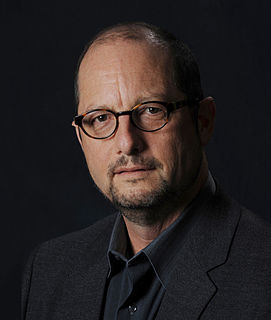A Quote by Marilynne Robinson
Anybody who has read any biblical scholarship knows that every scholar struggles over completely intractable problems with the original texts, or what they have to work from. It's one of the great, powerful, mysterious objects that have come down through history. This does not translate into literal interpretation for me.
Related Quotes
Scholarship aimed at truly understanding what the biblical writers meant often does not filter down into the church and through the pulpit to folks who show up on Sunday. I think that's just wrong, but scholars rarely make any effort to decipher their own scholarly work for people outside the ivory tower.
I think the evidence is just so overwhelming that Jesus existed, that it's silly to talk about him not existing. I don't know anyone who is a responsible historian, who is actually trained in the historical method, or anybody who is a biblical scholar who does this for a living, who gives any credence at all to any of this.
Archaeology in general is the recovery and study of the material culture of past civilizations. Biblical archaeology is as an application of the science of archaeology to the field of biblical studies. Through the comparison and integration of Scripture with the evidence of history and culture derived from archaeology, new insights into the biblical context of people and events, and sometimes the interpretation of the text itself, are possible. In this way archaeology serves as a necessary tool for biblical exegesis and for apologetic concerns.
What I am trying to say is that it is not without any value. The value of copies is that they can direct us towards the original. I was recently at the Louvre Museum and I was filming people who were viewing the Mona Lisa. I noticed the number of ordinary people, astonished, mouths agape, standing still for long stretches looking at the work, and I wondered, "Where does this come from? Are these people all art connoisseurs?" They are like me; through the years, we've seen this work in our schoolbooks or art history books, but when we stand before the original, we hold our breath.
In my life I have had to work through problems of stigmatization and prejudice. When I discovered the power of the arts to express my pains and joys, it became clear to me that there would be no other way to work through the demons except to fully embrace the process of creation. The work was not personal therapy but had a connection to other peoples' realities. As I grow older and more mature, it becomes clearer to me that personal struggles and conflicts are connected with universal struggles and conflicts. It is this knowledge, ironically, that gives me the freedom to experiment in my work
We current Justices read the Constitution in the only way that we can: as Twentieth Century Americans. We look to the history of the time of framing and to the intervening history of interpretation. But the ultimate question must be, what do the words of the text mean in our time. For the genius of the Constitution rests not in any static meaning it might have had in a world that is dead and gone, but in the adaptability of its great principles to cope with current problems and current needs.
How many times have you struggled with the interpretation of certain Biblical texts related to the time of Jesus' return because they did not fit with a preconceived system of eschatology? Russell's Parousia takes the Bible seriously when it tells us of the nearness of Christ's return. Those who claim to interpret the Bible literally, trip over the obvious meaning of these time texts by making Scripture mean the opposite of what it unequivocally declares. Reading Russell is a breath of fresh air in a room filled with smoke and mirror hermeneutics.
The infallibility and inerrancy of biblical teaching does not, however, guarantee the infallibility and inerrancy of any interpretation or interpreter of that teaching; nor does the recognition of its qualities as the Word of God in any way prejudge the issue as to what Scripture does, in fact, assert. This can be determined only by careful Bible study.
My claim is simply that the literary approach is one necessary way to read and interpret the Bible, an approach that has been unjustifiably neglected. Despite that neglect, the literary approach builds at every turn on what biblical scholars have done to recover the original, intended meaning of the biblical text.
Now we're living in a nuclear age, and the science that was supposed to be automatically for human welfare has become a nuclear - a science that gives us nuclear weapons. This is the ironic character of human history, and of human existence, which I can only explain, if I say so, in Biblical terms. Now I don't mean by this reason that I will accept every interpretation of Christianity that's derived from the Bible as many people wouldn't accept my interpretation. But that's what it means for me.
Mister Cameron - I have read the unexpurgated Ovid, the love poems of Sappho, the Decameron in the original, and a great many texts in Greek and Latin histories that were not though fit for proper gentlemen to read, much less proper ladies. I know in precise detail what Caligula did to, and with, his sisters, and I can quote it to you in Latin or in my own translation if you wish. I am interested in historical truth, and truth in history is often unpleasant and distasteful to those of fine sensibility. I frankly doubt that you will produce anything to shock me.
The task of all Christian scholarship—not just biblical studies—is to study reality as a manifestation of God’s glory, to speak and write about it with accuracy, and to savor the beauty of God in it, and to make it serve the good of man. It is an abdication of scholarship when Christians do academic work with little reference to God. If all the universe and everything in it exist by the design of an infinite, personal God, to make his manifold glory known and loved, then to treat any subject without reference to God’s glory is not scholarship but insurrection.







































